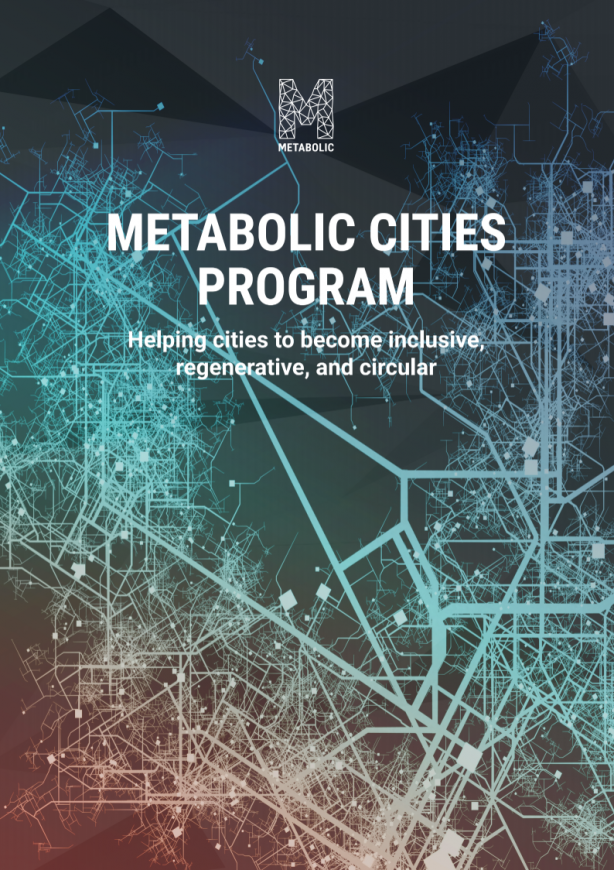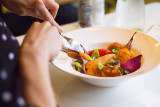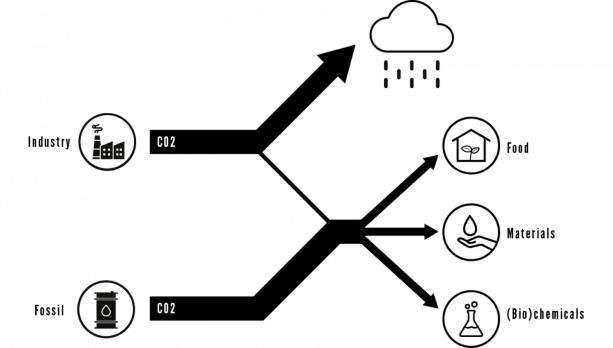Stay in the know on all smart updates of your favorite topics.
Moving from a linear to a circular economy means minimising the waste and pollution by reducing, recycling and reusing. The City of Amsterdam aims to redesign twenty product- or material chains. The implementation of material reuse strategies has the potential to create a value of €85 million per year within the construction sector and €150 million per year with more efficient organic residual streams. Amsterdam set up an innovation program on the circular economy; www.amsterdamsmartcity.com/circularamsterdam. By converting waste into electricity, urban heating and construction materials, the Amsterdam Electricity Company generates 900 kWh per 1000 kg of waste. 75% of the sewage system is separated for waste and rain water and the silt which remains after treating waste water is converted into natural gas. Share your innovative concepts and ideas on circular economy here.
RUMORE
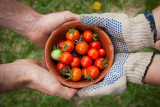
Strengthening regional innovation, collaboration and knowledge exchange on the organic residual flow cycle.
In the field of the circular economy, the City of Amsterdam sees particular opportunities in redesigning the organic residual waste chains in the Amsterdam Metropolitan Area (MRA). The City is therefore participating in the European RUMORE project (Rural-Urban partnerships MOtivating Regional Economies), which is aimed at strengthening, inspiring and helping out start-up, innovative SMEs in the organic residual flow and agrifood sector.
In RUMORE, Amsterdam, Hamburg, Lombardy, Central Macedonia, Thessaloniki, the Lüneburg region, the Burgas Province (Bulgaria) and the Green Knowledge Port of Twente exchange knowledge and experiences. RUMORE aims to accelerate innovations and urban-rural knowledge exchange, with the intention of helping improve the policy instruments of each of the partners. In the case of Amsterdam, this is the Kansen voor West operational programme: https://www.kansenvoorwest2.nl/nl/
The priorities for Amsterdam are improving the chains of organic residual flows between the city and the surrounding region and reducing the ecological footprint. The emphasis is on research and companies that focus on the valuable use of organic waste streams and the development and marketing of new plant-based protein sources as alternatives to meat. In RUMORE, the City collaborates with knowledge institutes and entrepreneurs from the Amsterdam Metropolitan Area in a local stakeholder group. This joining of forces is expected to contribute to a necessary transition to a sustainable, circular food chain.
Members of the local stakeholder group include GRO Holland (produces oyster mushrooms on coffee grounds and makes vegetable, protein-rich products from them), The Dutch Weed Burger (products made from seaweed), GrowX (self-sufficient vertical farm: sprouts, herbs and lettuce, produced in a high-rise building and Amsterdam Metropolitan Solutions (conducts research into the optimal reuse of organic waste streams).
The stakeholders introduce themselves here: Stakeholder group RUMORE
(see the pdf below)
More information about the Amsterdam circular programme can be found at www.amsterdam.nl/circulair
More information on the EU RUMORE project and partners can be found at https://www.interregeurope.eu/rumore/
Other EU projects in which the City of Amsterdam takes part: https://www.amsterdam.nl/bestuur-organisatie/organisatie/ruimte-economie/amsterdam-europa/europese-projecten/
https://www.interregeurope.eu/rumore/
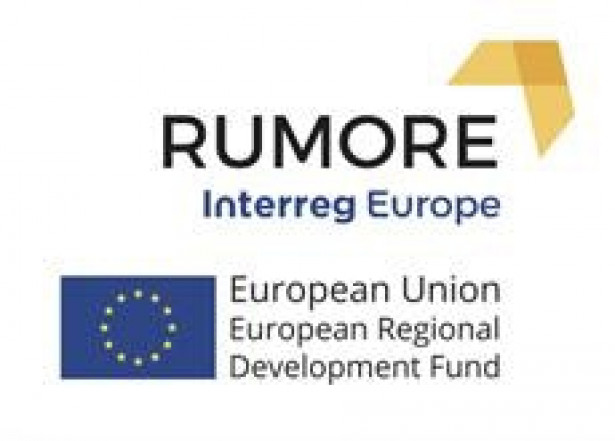
Re-store

In the research project Re-store knowledge is developed how to assess the impact of solutions to process organic waste. What indicators are most important and how will it be possible to measure those.
In order to ensure that there is enough food, materials and energy for everyone in 2050, our economy must become circular. There is no more waste in a circular economy - waste is raw material. Based on this vision, the AUAS works on knowledge development about circular products and processes. The Re-Organize project investigated how organic waste in urban agriculture areas can be reused locally using new solutions. Examples include local bio-fermentation, composting and insect breeding. The new Re-StORe project will extend the scope of urban agriculture research into the built environment.
Would you like to know more about the project or would you like to get involved, please contact Maarten Mulder, projectmanager of Re-store, m.mulder3@hva.nl
Circular Organic Waste in Amsterdam

Circular Organic Waste in Amsterdam is a thesis project carried out in a collaboration between the UvA Faculty of Science, the Amsterdam Business School and the Van ’t Hoff Institute for Molecular Sciences (Research Priority Area Sustainable Chemistry)The aim of the project is to investigate on the potential of separate organic waste collection and treatment in improving the circularity of Amsterdam. Amsterdam wants to become a sustainable and circular city by 2050 and increase recycling to 65% of waste by 2020 (currently around 27%). In addition, in April 2018, the European Parliament has adopted the revised Waste Framework Directive which declares that all member states shall ensure that biowaste is separately collected by 2023. Therefore it is clear that the separate collection of organic waste represents both an opportunity for the city to get closer to its targets and a necessity.
Currently, organic waste is not separately collected and it is just incinerated with the residual waste. In this way, energy is produced but all the nutrients and organic matter are lost and so all the value. Other treatments, more specific for organic waste, could allow for the recycling of nutrients, the retention of the value and even the upcycling of some materials. However, the introduction of another waste stream separately collected raises organizational, logistic and transportation issues. Therefore, this research aims at analyzing various potential collection solutions that could minimize costs and environmental impact making feasible and convenient the separate collection of organic waste and different possible treatments for this waste stream.
The analysis will be based on interviews, case studies and literatures and will be performed from different perspectives in order to have a systemic vision. Parallelly also the city of Amsterdam and its different sub-environments will be analyzed in order to understand the specific needs, limitation and opportunities of each different area. Combining the results, the most successful case studies that fit best in the characteristics of the city will be selected and integrated in different sustainable business models.
The set of business models proposed will produce an overall strategy for the management of organic waste following the principles of sustainability and circular economy as much as possible.
At the same time, the research will be backed by a social analysis performed through a questionnaire in order to get data on the real perception about this issue among Amsterdam’s inhabitants. The questionnaire will also help to get data on what would be the best instruments to incentivise the separate collection of organic waste and what the biggest barriers to its realisation are.
You can access the questionnaire through this link:
Circular & Upcycled Oyster Mushrooms in the City Centre

We want to locally grow & distribute oyster mushrooms from a locally diverted waste stream: office and hospitality coffee grounds. For this process, you need four things: coffee grounds, mushroom spawn, a cold room and a warm room.
We’ve started collecting green waste and coffee grounds from fourteen businesses in Secret Village (west part of Reguliersdwarsstraat and its side streets), every weekday. We currently compost all of it in the area, but we’d like to start producing oyster mushrooms from the coffee grounds ASAP. We’ve secured the cold room, but we’ve yet to find a small local space (±10m2, ±500m from Muntplein) that can function as the warm room. We’re also working on finalising a participation project with the municipality, for manpower needed for the collection and distribution of coffee grounds and mushrooms.
See also
Secret Village project page: www.greencitybuzz/secret-village
To read about all our activities in Secret Village, navigate to http://www.greencitybuzz.nl/secret-village/#projecten
Metabolic Cities Program
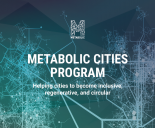
Given their immense ecological footprint and impact on human wellbeing, it is critical that cities make the transition to become sustainable and circular. Yet accessing the right resources and crafting the right policy isn’t easy. The Metabolic Cities Program is here to help.
For more information, read about the program here or look at the full Metabolic Cities Program brochure.
Get in touch by emailing <a>cities@metabolic.nl</a> or call +31 (0) 203690977
Roadmap Circular Land Tendering
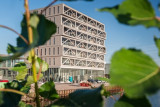
With the Roadmap Circular Land Tendering, Amsterdam developed an instrument with which a contractor can secure circular building. The municipality will use the Roadmap this year and early next year for the issue of residential building plots and a non-residential building plot. Later, the instrument will also be used for tenders in the area of transformation, renovation and demolition.
The Roadmap will be evaluated later on based on the practical experience with the tenders. The municipality wants to contribute to the development of a national standard for circular building. From the evaluation, the recommendation also emerges whether and to what extent circular tendering will become policy in Amsterdam.
The Roadmap has been composed by Metabolic and SGS Search, together with the municipality, market parties and external experts.
You can find the Roadmap here: https://www.amsterdam.nl/wonen-leefomgeving/duurzaam-amsterdam/amsterdam-circulair/wereldprimeur/
Later on, probably after the evaluation, it will be translated in English.
Circular Expo

A temporary exposition from 9 till 27 October in the Herstelling at the Town Hall to provide practitioners of circular projects in the city and the municipality Amsterdam a place to show their work and take the spotlight. Learn what a circular economy is and how the whole city is working on becoming and staying circular.
Opening 9 October
End 27 October
Special program follows later
Do you have an innovative circular product or project and want to show it at the circulair expo? Contact Ward Mesman at w.mesman@amsterdam.nl
Het Vuilrak

On a location in Haarlem we focus on co-creational development of circular solutions for businesses.
The Great Bubble Barrier
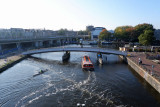
Every year, more than 8 million tons of plastic pollution ends up in our oceans of which 60-80% originates from rivers. Plastic does not biodegrade and causes great harm to the environment. Marine life gets entangled in plastics, vessels get damaged and microplastics form a health hazard for the smallest to the largest organisms. The Great Bubble Barrier has developed a technology which can intercept plastic pollution in rivers before it reaches the ocean: the Bubble Barrier, a bubble curtain with a catchment system.
The first long-term Bubble Barrier in the world was placed in November 2019 at Westerdok in Amsterdam.
Watch the video of Bubble Barrier Amsterdam.
THE BUBBLE BARRIER SYSTEM: HOW DOES IT WORK?
The bubble curtain is created by pumping air through a perforated tube on the bottom of the waterway. We make use of the natural flow of the river. The plastic waste will be directed to the side and into our catchment system at the riverbank, where it will be retained and removed from the water.
- It does not hinder ship traffic
- It covers the full width and depth of the waterway
- It allows fish to pass
Visit the Bubble Barrier Amsterdam at Westerdoksplein.
Will the next Bubble Barrier be in your river or city? Send The Great Bubble Barrier a message!
Mid-scale waste-to-value transformers, on-site

Turn your last-night leftovers into energy that powers your household!
The Waste Transformers was started in 2012 by Lara van Druten. Lara had one goal: to create a flourishing business that inspires others to change the way that they deal with waste and to establish a business model able to balance financial, social and environmental returns. Today, the Waste Transformers are the recognised partner of choice for those with the ambition and courage to realize real, circular economies around waste.
The Waste Transformers creates another small-scale circular economy in Amsterdam
Meaningful Circular Metabolism
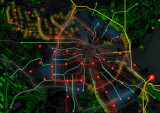
Using flow analysis to validate and quantify the spatial impact of measurements for circularity and using urban design to see how these measurements can be integrated in the context of the city.
More information can be found in my booklet. Or for further information or requests I can be contacted. I will be happy to try and answer the questions/requests.
The Excess Materials Exchange
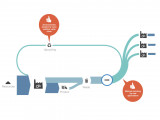
Let's be honest. Waste today does not equate something of value, it equates something that is worthless. This is exactly what we want to change with the Excess Materials Exchange.
Join the $1 million #CircularDesign Challenge

Organizations involved
THE NEW PLASTICS ECONOMY INITIATIVE
The New Plastics Economy is an ambitious, three-year initiative to build momentum towards a plastics system that works. Applying the principles of the circular economy, it brings together key stakeholders to rethink and redesign the future of plastics, starting with packaging. The initiative is led by the Ellen MacArthur Foundation in collaboration with a broad group of leading companies, cities, philanthropists, policymakers, academics, students, NGOs, and citizens.
The initiative is supported by Wendy Schmidt as Lead Philanthropic Partner, and MAVA Foundation, Oak Foundation, and players of People’s Postcode Lottery (GB) as Philanthropic Funders. Amcor, The Coca-Cola Company, Danone, MARS, Novamont, PepsiCo, Unilever, and Veolia are the initiative’s Core Partners.
ELLEN MACARTHUR FOUNDATION
The Ellen MacArthur Foundation was created in 2010 to accelerate the transition to a circular economy. The Foundation works across five areas: insight and analysis, business and government, education and training, systemic initiatives, and communication. With its Knowledge Partners (Arup, IDEO, McKinsey & Co., and SYSTEMIQ), and supported by Core Philanthropic Funder (SUN), the Foundation works to quantify the economic opportunity of a circular model and to develop approaches for capturing its value. The Foundation collaborates with its Global Partners (Danone, Google, H&M, Intesa Sanpaolo, NIKE, Inc., Philips, Renault, Unilever), and its CE100 network (businesses, universities, emerging innovators, governments, cities and affiliate organisations), to build capacity, explore collaboration opportunities and to develop circular business initiatives. By establishing platforms such as the New Plastics Economy initiative, the Foundation works to transform key material flows, applying a global, cross-sectoral, cross value chain approach that aims to effect systems change.
www.ellenmacarthurfoundation.org | @circulareconomy
INTERNATIONAL SUSTAINABILITY UNIT
The Prince of Wales's International Sustainability Unit (ISU) was formed in 2010 to address critical challenges to development and the environment. The ISU builds on the success of The Prince’s Rainforests Project, established to help find a solution to tropical deforestation. With an international reputation for neutral convening, underpinned by rigorous analysis, the ISU engages key actors from Governments, the private sector, research communities and civil society to catalyze positive change across the global sustainability agenda.
The ISU's Marine Programme focuses on the global transition to a sustainable Blue Economy. The core components of this work include fish stock recovery, coral reef health and marine plastic pollution. During the last six years the ISU has brought together stakeholders from all sectors to accelerate solutions to some of the most pressing ocean-related challenges and build consensus on solutions for and a pathway towards a sustainable Blue Economy.
WENDY SCHMIDT
Wendy Schmidt is President of The Schmidt Family Foundation, where she works to advance the development of renewable energy and the wiser use of natural resources. The Foundation houses its grant-making operation in The 11th Hour Project, which supports more than 150 non-profit organizations around the world in program areas including renewable energy, ecological agriculture, human rights, and our maritime connection through its 11th Hour Racing program. In 2009, Wendy Schmidt and her husband, Eric Schmidt, created the Schmidt Ocean Institute (SOI), and in 2012 launched the research vessel, Falkor, as a mobile platform to advance ocean exploration, discovery, and knowledge, and catalyze the sharing of information about the oceans. Since 2012, Falkor has hosted more than 500 scientists from 27 countries.
To further her commitment to ocean issues, in 2010 Wendy Schmidt partnered with XPRIZE, following the Deepwater Horizon disaster, to sponsor the Wendy Schmidt Oil Cleanup XCHALLENGE, a $1.4 million competition designed to identify efficient and innovative solutions to clean up surface oil spills. Wendy Schmidt once again partnered with XPRIZE in 2012 to design the Wendy Schmidt Ocean Health XPRIZE, a $2 million purse, awarded in July, 2015, where competitors responded to the global need for accurate and available sensors to more broadly measure the signs of ocean acidification, one of the harbingers of climate change.
Wendy Schmidt is the Lead Philanthropic Partner of the New Plastics Economy Initiative, which is led by the Ellen MacArthur Foundation. Wendy earned an M.J. in Journalism from The University of California at Berkeley, and a B.A. magna cum laude from Smith College.
Follow Wendy on Twitter: @wenschmidt
Your pollutant is our resource!

From bacteria to building-blocks
Zero Waste Expedition Plantage Amsterdam
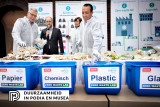
Reducing waste, encourage recycling, converting waste into commodities: developing a new way of sustainable waste collection and disposal.
CO2 Smart Grid
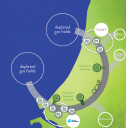
How will we provide food to growing cities with a shrinking amount of agricultural land? How can we provide enough fresh water for everyone? Just as relevant: how should we make the transfer to a safe, clean and reliable energy supply?
How will we provide food to growing cities with a shrinking amount of agricultural land? How can we provide enough fresh water for everyone? Just as relevant: how should we make the transfer to a safe, clean and reliable energy supply?
The large amount of CO2 put into the atmosphere because of human activity causes climate change, threatening our quality of life and security and that of future generations. This has been acknowledged by (inter)national governments – for instance at the COP21 in Paris in 2015 -; They pledge large emission reductions. In the Netherlands, we aim for a reduction of 85-95 percent by the year 2050.
So, we have to reduce CO2 by expansive measures, and everyone should feel the responsibility to work on this challenge as effectively as possible. However, perceiving this issue as only a problem, by incrementally reducing CO2, will not lead to a satisfying end result. We should instead approach this as a huge opportunity for the Dutch economy. Our statement?
CO2 IS NOT ONLY A POTENTIALLY DANGEROUS WASTE MATERIAL, IT IS ALSO A IMPORTANT ASSET FOR THE CIRCULAR ECONOMY.
What is the situation?
CO2 is a raw material in for instance the horticulture and the chemical industry. This is a business case with growth potential.
What do we want to do?
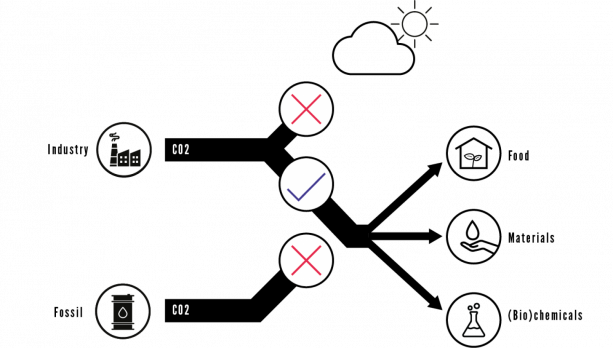
Use CO2 in a smart way so we can reduce the use of raw materials of fossil origin.
Knowledge map Circular Economy

Knowledge map made by scientist and entrepreneurs to get easy acces to all kind of knowledge in the field of circular economy. More than 200 reports and books are summarized in an easy format. The knowledge map is up to date and will be refreshed twice a year. The map is coordinated by The Green Mind (Het Groene Brein): www.hetgroenebrein.nl
Ozarka - Amsterdam's first #NoSUPP Grocery Store
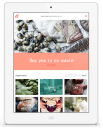
Offering a disruptive grocery-shopping model that reduces packaging waste dramatically, without sacrificing convenience.
Opening in Amsterdam in Spring, 2018: Ozarka is a new-concept shop offering upmarket, gorgeous, high-quality yet affordable specialty foods, every-day grocery, and personal care products. We will also feature a prepared foods station and salad bar that is self-serve and sold by weight.
Best of all, Ozarka is a #NoSupp* retailer. We will sell no product wrapped or packaged in single-use plastic. We will make it incredibly enjoyable *and* convenient for our customers to participate in sustainable shopping.
Plastic packaging has created one of the most severe environmental crises of our time. We use far more of it that we can recycle or manage and most of it ends up in landfill, or polluting our oceans and terrestrial environment (only 8% of plastic is recycled worldwide).
Ozarka's model aims to drastically reduce and remove plastic from our daily lives without compromising quality or convenience in every day shopping. Our food is beautiful. Our shopping experience is beautiful. With our customers we will keep the planet beautiful.
Say yes to Ozarka. Say yes to #NoSUPP
We are inviting suppliers to contact us and join in this vision. Specifically:
Fruit and vegetable producers
Local cheese makers
Local beter-leven dairy
Caterers and gourmet food truck vendors
High end personal product makers looking to prototype a refills model: soaps, shampoos, conditioners (think Kiehls, Body Shop, Kevin Murphy)
Bio-based, single-use packaging manufacturers
Compostable packaging manufacturers
Industrial composting facilities
*NoSUPP = No Single Use Plastic Packaging
Circular waste bags

Do you realize that most plastics bags and containers used to collect waste are actually still made from virgin plastics..... That is why GreenWavePlastics and Amsterdam based CitiesFoundation have introduced a 100% recyclate content waste bag for the WASTED program in Amsterdam Noord. All produced in The Netherlands Who is next ??
Email : greenwaveplastics@live.nl
Stay up to date
Get notified about new updates, opportunities or events that match your interests.
